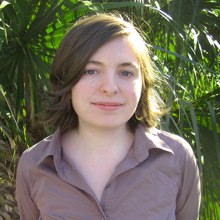Boluk & Eccentric Games
Stacey Mason

Stephanie Boluk was part of the remarkable team of graduate students that put together last month’s Future of Digital Studies conference in Gainesville, drawing together many of the leading scholars of digital literature on a shoestring budget.
Boluk presented a paper, coauthored by Patrick LeMieux, that explores eccentric games. Current computer games, as they observed at DAC09, are obsessed with realism. But the world inside the computer is not the world we know: when walls are just bits in memory, teleportation or time-travel can be as real as a cloud on a sunny day. “Eccentric games”, they write, “give the player access to logics indigenous to digital environments. These logics often reference pop-physics theories and paradoxes such as those related to time travel, parallel realities, navigating multiple dimensions, folding time and space, quantum mechanics, probability engines, and the conflation of virtual and actual space.“
These are a class of games that fantasize the mastery of time and space, like Portal, Braid, or Prince of Persia. New experiments turn the idea of game upside down: in Achron , for instance, you use time travel to go back and fix mistakes you made earlier in the game.
Boluk says these games as represent the uncanny, in Freudian terms this is that cognitave dissonance that causes us to be simultaneously attracted to and repulsed or unsettled by something that is strangely familiar yet foreign or other. Eccentric games are not limited to the fringes of the game industry, but seem to be leaking into net art, as seen in Love by Eskil Steenberg.
Patrick and I picked this collection of games because we noticed they have formal elements that tie them together in a way that cuts across the typical genres (rpg, fps, rts, etc.) as well as the social conditions under which they are produced (commercial, independent, community, etc.). We like to think of these games as simulating the DASW rather than producing it as Hansen describes regarding Lazzarini's skulls.. These aren't the only kind of games around (Pat's dissertation at Duke will probably take this further by looking at minimal games, abstract games, procedural games, etc.), but we found it productive to think of these games as producing "eccentric" effects.
She and I have been corresponding since the conference, discussing her work on eccentric games and their implications to both gaming and art. Stay tuned for more on her work, particularly a scholarly anthology on zombies. Boluk and LeMieux will be speaking at the upcoming ELO_AI conference in Providence, June 3-6, 2010.
